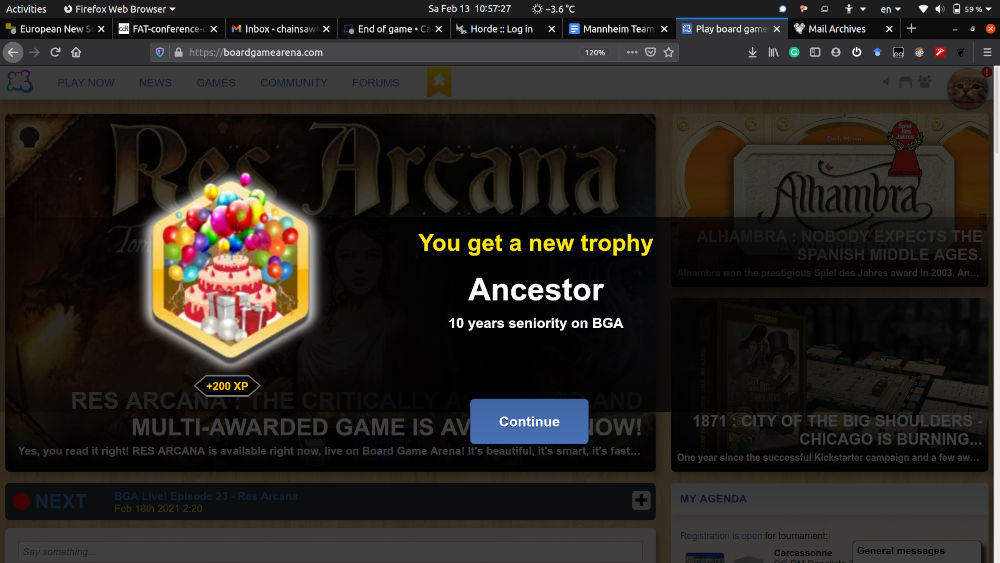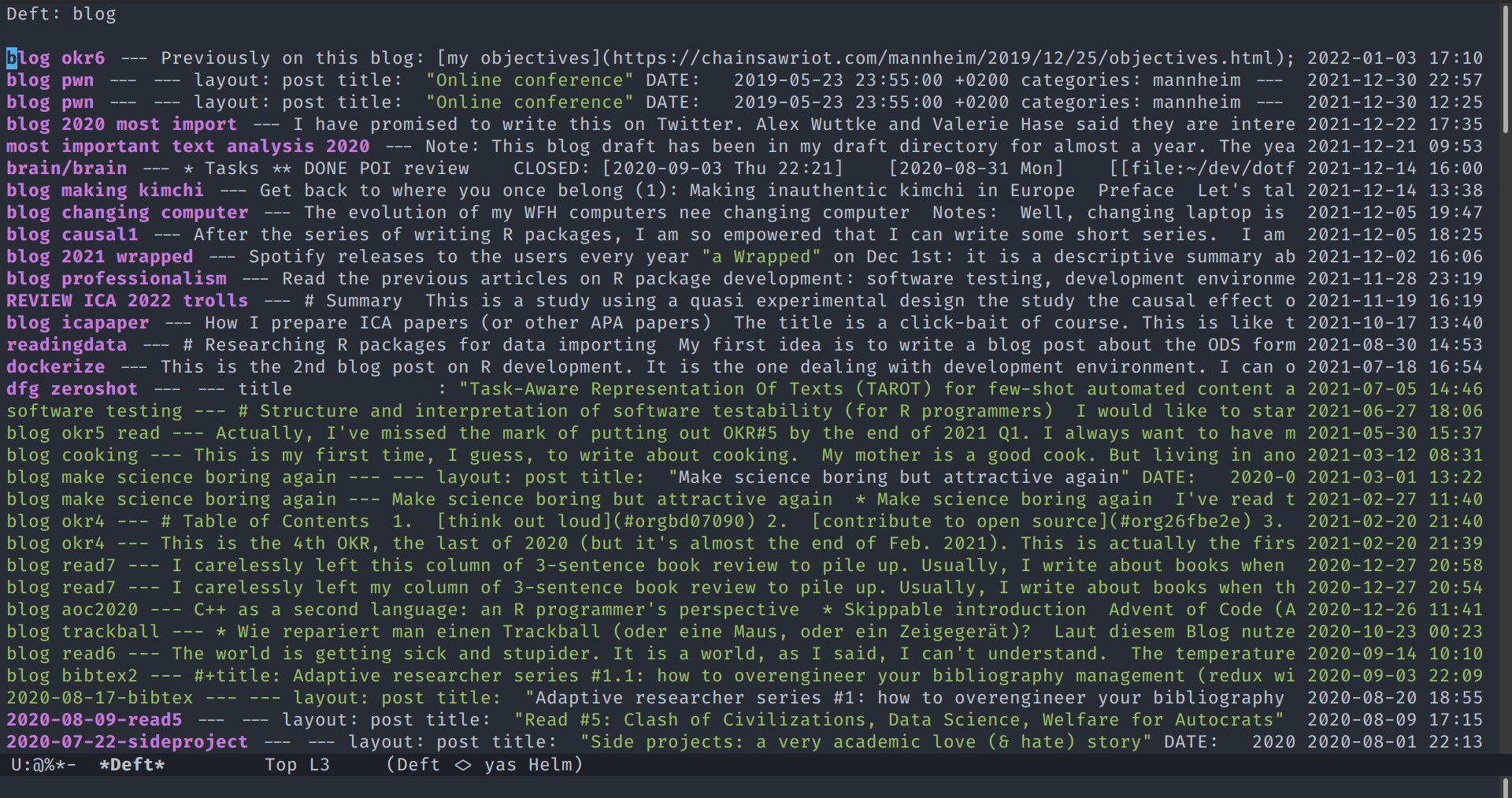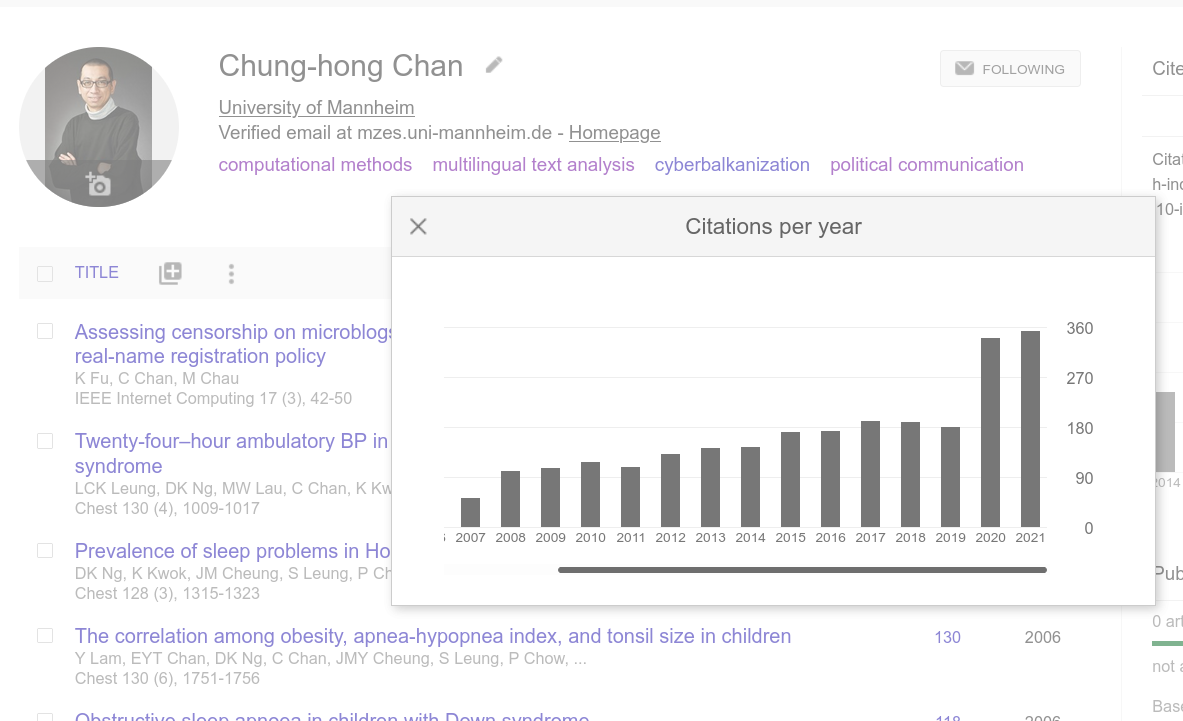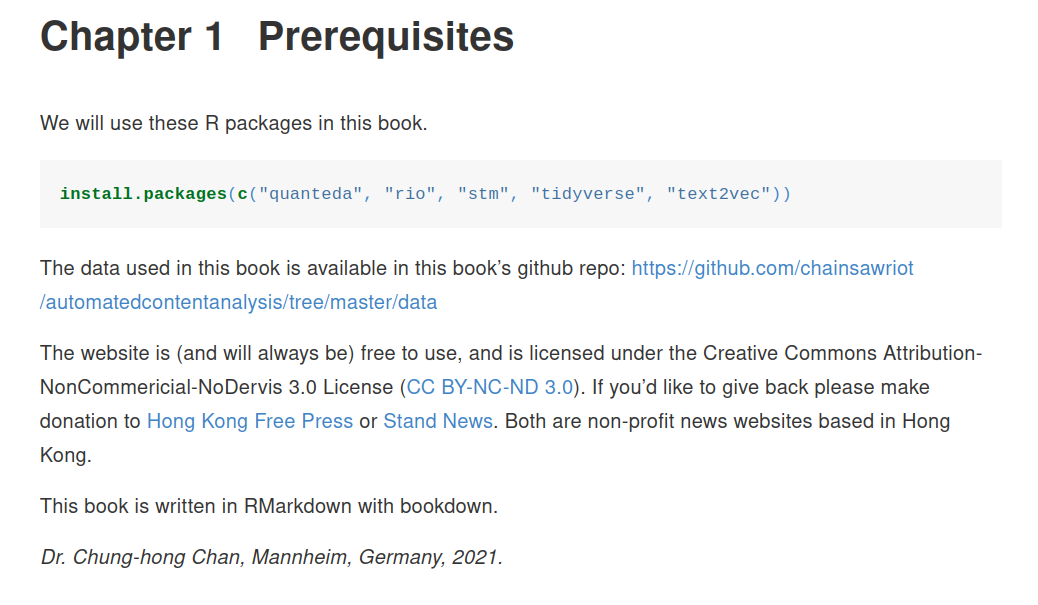chainsawriot
Home | About | ArchiveOKR #6

Previously on this blog: my objectives; actual OKR #1, #2, #3, #4, #5.
I decided to make my OKR twice a year. The last one was May 30 2021, so the next one should be basically now. And here it is.
As I did previously, let me write about the world. In the last OKR, I said “I would expect that in the 2nd half the world will gradually reopen.” Well, I am not good at predicting things. First, there was and still is the Delta variant (actually I think it would be cool to write it in the original Greek character: Δ variant); and then at the beginning of December, there is Omikron (Ο variant). Many European countries attempted to open, the most famous is probably the “freedom day” on July 19 in the UK. Then on September 1, in Denmark. The relaxation cycle in summer 2021 was exactly like the previous summer. Then also exactly liked the previous end of summer, the corona strikes back as many epidemiologists have predicted for two years in a row.
This year should be different. On one hand, we have effective vaccines. In rich countries, probably too many effective vaccines. On another hand, well, rich people refuse vaccines and poor people have no access. The virus is still spreading and mutating. Thus, it lingered for another year. In the fall of 2021 we saw another unprecedented peak of infection. If I need to say something positive about this, well, majority of the population in rich countries have been vaccinated. Compared with the previous peak in 2020 deaths have been cut at least half, thanks to the effective vaccines.
Here is where the world stands: the pandemic is still rampant with no end in sight. In Germany, epidemiologists are talking about the upcoming 5th wave in early 2022. (In OKR #3, I still talked about the 2nd wave. There have been already two waves in between Oct 2020 and Dec 2021.) The year 2021 will be remembered as the year of loss. I think we probably have lost more in 2021 than in 2020: Lives, freedom, democracy, normality, dignity, human decency, just to name a few.
I asked my wife this question increasingly often in the 2nd half of 2021: Is it possible to find one single positive information from the news? I don’t want to be a news avoider, but I’ve tried to focus less on the news 1. If I really don’t care about the surrounding, I think I am doing fine with only a bit lost. I have been vaccinated thrice. I turned 40 in 2021. I don’t feel that I have major health issues. Yes, there were some minor migraine attacks in between but those were minor. I am functioning: I cook, I eat, I play 2 etc.
I read also. Last time I said “The Scientists” (John Gribbin) reignites my hunger for long boring history books. In the 2nd half, all of the book I read are long boring history books. They were really go to read before sleep. “Doom” is not entirely history but with the author’s (wrong) predictions about the pandemic and his imperial style thinking, though.
- The Habsburgs (Martyn Rady)
- How to Be a Dictor (Frank Dikötter)
- Russia (Dmitri Trenin)
- The Shortest History of England (James Hawes)
- Doom (Niall Ferguson)
- The Cold War (John Lewis Gaddis)
- The Penguin History of the United States of America (Hugh Brogan)
Let’s OKR.
think out loud

I think I did quite well since the last OKR. I wrote 10 blog posts in the period. That includes a 4-post series of writing R packages, a few rather academic-y posts and most importantly, a post celebrating the 20th anniversary of this blog!
The productivity for writing was partly due to the fact that I really have something to say. But unlike the academic celebrities or KOLs, I don’t think people want to listen to me. So I think it would be a better idea to just write what I want to say. I have one reader in mind and he is my future self. I think out loud to my imaginary future self.
I still have a backlog of blog drafts. In December, I finished two of them. (The top papers and WFH computers). I am still writing some of them. Hopefully, I can clear most of them.
In 2021, I was quite active on Twitter. As a review, I shouldn’t. I shouldn’t think out that loud on Twitter. After a decade of using Twitter, I think I’ve come to an ultimate vision of what Twitter actually is. With the algorithm, Twitter is a place where you see what the famous KOLs say and retweet (which commoners allegedly need to be cared) and commoners are trying very hard to promote themselves to the status of KOL. On the Saint Silvester’s day, I suddenly came to this vision because my timeline was full of tweets tweeted or retweeted by famous people I’ve never met. Do I care about what these famous people say or retweet? I don’t. I think you should also try yourself. Count how many of the tweets in your timeline that you really care about. How many of them are tweeted or retweeted by the people you don’t know or you don’t actually care about? You probably would come to the same vision. I had a oblivion that the decision to follow someone is an act of showing I care about what he or she says. But I was wrong. In many cases, I followed someone simply because he or she is famous. What he or she says matters nothing to me. Sometimes, what these famous people posted — memes, political statements with no action, balderdash — make me so tired. Because they are famous and thanks to the algorithm, those information dominated my timeline. It made me so tired.
On the New year’s day, I unfollowed a quarter of accounts I used to follow. My timeline is now less fatigue-inducing. It is important to point out that I’ve been using the Tweetdeck already. Not the ordinary Twitter. The ordinary Twitter is even more prone to alogrithm’s influence. Still, I think I will keep pruning my followees.
contribute to open source

oolong 0.4.1 and sweater 0.1 are on CRAN now. oolong 0.4 is a pretty big improvement over the previous iterations. The deployment feature took me a lot of time.
I don’t think my packages are widely used. I’ve also contributed to various R packages, notably Barrie & Ho’s academictwitteR 3. I have also done some Javascript and CSS. Actually, sweater is also my first package with C++ code in it.
As a review, I think I also confirm my thinking: one needs to code in multiple languages to be a really good programmer. I think I’ll keep this direction of trying to program in multiple languages. At the same time, I’ll improve my own craft. Mostly through writing about it.
More on this in the “publish a book” section.
publish top papers

Since last time, three papers with my names on it got published. In all of them, I am coauthor and all of them are in top journals.
- Wessler, H., Althaus, S. L., Chan, C. H., Jungblut, M., Welbers, K., & van Atteveldt, W. (2021). Multiperspectival Normative Assessment: The Case of Mediated Reactions to Terrorism. Communication Theory.
- Welbers, K., Van Atteveldt, W., Bajjalieh, J., Shalmon, D., Joshi, P. V., Althaus, S., Chan, C. H., Wessler, J., & Jungblut, M. (2021). Linking event archives to news: a computational method for analyzing the gatekeeping process. Communication Methods and Measures, 1-20.
- Dobbrick, T., Jakob, J., Chan, C. H., & Wessler, H. (2021). Enhancing theory-informed dictionary approaches with “glass-box” machine learning: The case of integrative complexity in social media comments. Communication Methods and Measures, 1-18.
The last one is special. I have a series of three papers which I want to publish to rectify the chaotic world of using “off-the-shelf” dictionaries. I call them the three nails in the coffin. I have finally published all three. I could write something about the three papers. More on this in the “publish a book” section.
One final point on this is that I’ve done quite a lot of peer review this year. Apart from reviewing for conferences, I did 16. Giving the fact that I published 5 papers this year, I think my ratio of 3 peer reviews per one published paper should be just enough (Given most journals source two reviews per submission, some source three or even more). I think most journals have an increased number of submissions, thanks to the pandemic 4. The peer review system seems not to be able to cater for this “increased productivity”. Many of my own submissions have a very long peer review time. Five months seem to be the bare minimum. Some could be a year. Having said so, I need to make it clear that this is not a complaint. But what I really want to say is that: if you could, take the peer review assignment.
Other than publishing, I’ve submitted grant proposals. One with my colleagues Philipp Müller and Hartmut Wessler has a positive outcome. Another is still waiting. How that translates into my mid- and longer-terms as a researcher is still uncertain. I can’t foresee how and where I will be now even in just 1-year term.
improve myself
Through writing more frequently, I can feel that my English (at least writing) has improved slightly. My German keeps receding unfortunately. To recount this, my wife and I went for a walk on the New Year’s Day. We heard a woman shouting at our back. I was not 100% sure what she was shouting. I just wanted to know what’s going on so I turned. Then I was greeted not with a “Frohes neues” but a racist insult. Not the first time being insulted like that. But like all the times I didn’t know how to respond. I froze.
A few years ago, my wife and I talked about our German level and we knew, and know, our language level is not sufficient to argue verbally. I think the ability to argue verbally is a true test of language fluency. First, you need to have the ability of maintaining the spontaneity of saying something. Second, you need to consider yourself equal or even superior to, both positionally and linguistically, the receiving end of your argument. Third, you need to maintain your language fluency even when you are in the emotion that sustains an argue.
As we are self-aware that we can’t argue in German, our conviction is to avoid conflicts with the locals. After four years in this country, I still can’t argue. But honestly speaking, I am not so sure whether I want to improve the situation. I can follow along in meetings (although I rarely voice out). Is it enough? Do I really need to be able to argue? I am not so sure. Also, I doubt myself too whether I still want to invest a vast amount of my time, like I did when I first arrived, to (re)learn the language.
Regarding my relationship with German (the language), it is complicated.
publish a book

Unlike in the last OKR, this one actually has some real progress. But I must say I took a detour to contribute some chapters to my colleagues’ book “APIs for social scientists”. It was fun. Also, it made me realize I can write (again). When I wrote for my colleagues’ book, I wrote quite smoothly. Unlike my previous experience of writing my own book in late 2020, I struggled a lot.
Out of my frustration with the social media (see above), I picked up the writing of my own book again in late December. Many things actually have changed since 2020. Just to quote a small one, the “whole game” chapter has an example of analyzing Donald Trump’s tweets. Well, Donald Trump is no longer the US president and he is banned from Twitter. Of course, Twitter API is now at v2. And most importantly, oolong is now a thing. So, simply modifying the book to reflect these changes in 2021 is already a big undertaking.
Picking up the writing task again actually makes me feel my growth in a year. Technically, I am now more verse with RMarkdown, Git, writing in Emacs, and R in general. After the “three coffin nails” (see above), I have more to write about automated content analysis.
I think the conviction is this: As an academic type, one is also an author and obligated to write (a lot). I’ve decided to devote some time into writing everyday.
-
I have legit concerns about my family and friends in Hong Kong. I don’t want to go into details as I vow not to write about Hong Kong in this blog while I am not in Hong Kong. ↩
-
I actually wanna write a blog post about how and what I play during the pandemic. Maybe I should do this even more often. ↩
-
Even though I don’t actually do Twitter research. ↩
-
This is actually a paradox. It is because the pandemic actually gave some researchers advantage, although those who have been given such advantage doesn’t want to admit that. However, many researchers — especially those with family or people needing their care — have reduced productivity. ↩